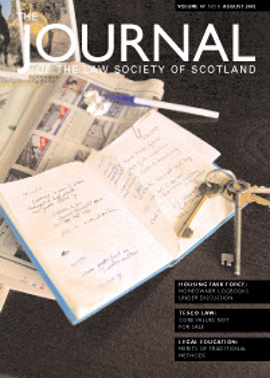“It’s good to talk”
“All that’s ever missing is a conversation”. These were the words of Larry Farmer, formerly CEO of a multinational group of companies, in his keynote address to the Edinburgh Conference of the Chartered Institute of Arbitrators last September. They reflect the awareness that in commerce and industry many disputes arise because of a simple failure in communication. Communication is either absent altogether or flawed in some way, leaving ample scope for misunderstanding, false assumptions or misconceptions. There are usually two sides to a story: it all depends on your perspective on events. Often, we see only one side.
Recently, we have seen a number of examples in Scotland of misunderstanding and misconceptions about the operation of the legal profession and the administration of justice. These have included the role of sheriffs and to whom they are accountable, the position of sentencing judges, the application of human rights legislation in politically-charged areas, the role of professional organisations as disciplinary bodies for their members, the level of fees apparently charged by the profession and the conduct of advocates in criminal appeals. Various groups are critical or sceptical about the law and those within it. Sometimes criticism comes from within. Sometimes the criticism or scepticism is justified - or motivated by ill-feeling. Often, though, it seems to stem from a lack of a full understanding of the legal system and the roles played within it.
The advent of the Scottish Parliament has created an entirely new situation for the legal profession. It may well be the case that those involved in decision-making are not fully aware of the way in which the profession works nor of how justice is administered in Scotland. That is quite understandable. There may be a similar ignorance among many lawyers of the imperatives and interests which drive policy. A natural instinct in a situation like this is for the profession to feel threatened by the decision-makers. This can, of course, produce confrontation. Conversely, of course, it may be that the decision-makers themselves feel threatened by the institutions of the law and tend to react against them. In both cases, misunderstanding and misconceptions can be damaging.
There must be scope for a conversation between key players in the legal system and the decision-makers in order to reduce misunderstanding and allay misconceptions. There must be much to be gained from discussing the benefits which a robust and independent legal system, profession and judiciary can bring to the people of Scotland, especially at a time of increasing legislative and administrative activity in Scotland. A thriving system of justice will be good for a thriving Scotland.
Such a discussion would be rigorous on central issues such as independence, but at the same time respectful of the position and needs of those who form and implement policy. A conversation which informs and enlightens on all fronts could be the platform for a successful review of the justice system. What about a Justice Forum, chaired by an independent facilitator, to encourage such a conversation?
Training the Bar
For the past eight years, it has been my privilege to serve as the first Director of Training and Education in the Faculty of Advocates. As I move towards the end of that role, it is interesting to reflect on the changes which have occurred in training for the Bar.
Before 1994, workshop-based advocacy training was practically unheard of in Scotland. Since then, 150 members of the Faculty have undertaken the eight weeks of structured training which the Faculty provides prior to admission, covering the whole range of basic advocacy skills. A further 100 or so have undertaken week-long training courses. 50 members have trained specially as advocacy instructors. We have been welcomed as leaders in advocacy training around the world. It can be said that, for many, advocacy is now approached more analytically and thoughtfully than ever be fore. This is best exemplified in the question which we encourage advocates always to ask themselves: “Why am I asking this question of this witness at this time in this way?”
Perhaps the training programme helps explain why the Faculty continues to attract large numbers of entrants. It brings with it another challenge however - a challenge which was addressed by all of the independent bars at the recent World Bar Conference in Edinburgh. Should competence in advocacy skills now be assessed and those deemed incompetent excluded from practice? If so, what criteria would apply and how would testing be achieved? These questions will engage us in the years ahead.
In this issue
- Scottish Solicitors’ Discipline Tribunal
- What price the core values
- “It’s good to talk”
- Homeowner logbooks a step too far
- The Judicial Appointments Board – a misnomer
- Changed days
- In praise of rote learning
- The best laid plans
- Communication can curb complaints
- Separate probation and community service
- Simplifying insolvency proceedings?
- Online negotiation – changing the norms
- Website reviews
- Under pressure
- In practice
- Europe
- Plain speaking
- Book reviews
- When law met hip-hop






